WEP holds RTD on setting the labor legislative agenda for the 19th Congress
The Workers and Employees Program (WEP) conducted a round-table discussion (RTD) last June 18, 2022 with the theme “Labor Legislative Agenda: Moving Forward.” Geared towards bringing to the fore the pressing issues and concerns of the labor sector that should be addressed by the incoming 19th Congress, and likewise, to present the WEP-proposed Disease Outbreak Benefits Bill for further feedback, the RTD included participants from labor groups, federations, a Party-List Representative, and law students.
Prof. Solomon F. Lumba, the Associate Dean of the UP College of Law, delivered the welcoming remarks. He expressed his gratitude to WEP as it continues to pursue strategic initiatives to optimize the human capital of the country.
WEP Program Director, Prof. Patricia R.P. Salvador Daway, provided a recap of the past RTDs organized by WEP to dissect and address the most pressing labor issues exacerbated by the COVID-19 pandemic. She emphasized that the RTDs are meant to encourage free discussion of labor issues which must be addressed by the incoming Congress.
Atty. Emir-Deogene V. Mendoza then delivered a brief presentation regarding the amendments made on the WEP-proposed Disease Outbreak Benefits Bill after consolidating the suggestions of participating labor unions, academics, and labor law experts from the past RTDs. The bill which originally proposed to grant to permanent, contractual, and job order employees benefits such as outbreak leave, hazard pay, the right to disconnect, and insurance, and incentives for compliant employers, will now include unemployment benefits, financial assistance to Overseas Filipino Workers (OFWs), and the right to work from home during outbreaks.
Prof. Marwil N. Llasos introduced the participants including representatives from Bayan Muna, the Church Labor Conference, NTUCP, TUCP, Buklod ng Manggagawang Pilipino, SALIGAN, Center for Trade Union and Human Rights, Pag-aalay ng Puso Foundation, the Institute for Occupational Safety and Health Development, the Crispin B. Beltran Resource Center, Center for Migrant Advocacy, Philippines, and Power Seko.
The program continued with the plenary session moderated by Prof. Arnold F. De Vera. During the plenary session, Bayan Muna Representative Ferdinand R. Gaite asked whether the proposed financial assistance to OFWs should be extended given the prolonged status of the pandemic. In response, Atty. Mendoza mentioned that WEP is open to the suggestion of extending the financial assistance in case the pandemic continues. Prof. Daway also suggested that the bill should determine the specific amount of the financial assistance to be given to OFWs should the pandemic extend to a certain period of time. She reiterated that the current one-time financial assistance given to OFWs under the Department of Labor and Employment (DOLE)-AKAP program is not enough to help the struggling OFWs and their families.
Representative Gaite also asked about the proposal of the bill in resolving the “No vaccine, no work policy” which the employers are practicing today. Atty. Mendoza responded that the bill will have a provision penalizing the mandatory vaccination of employees while Prof. De Vera mentioned that there are policymakers who are reluctant in penalizing employers who mandate vaccination considering the COVID-19 emergency status.
Mr. Narciso Dalumpines Jr. of Pag-Aalay ng Puso Foundation asked whether it is the employer or the DOLE which should shoulder the cost when an OFW gets sick in the course of employment. Prof. Daway answered that based on the standard employment contract, it is the employer who should be liable for the medication of an OFW. In the event that the employer will not help, the placement agency has a joint and several liability for the hospital and medical costs of the sick OFW. Ms. Irynn Abano of the Center for Migrant Advocacy stated that OFWs are also entitled to reimbursement from Philhealth, assuming that they are contributors. They are also entitled to certain medical benefits such as mandatory insurance from the agency and even visits from family members.
The RTD then ventured into discussing pertinent labor issues. Ms. Kamille Deligente of the Center for Trade Union and Human Rights (CTUHR) focused her concerns on the minimum wage increases, Security of Tenure Bill, and the recent attacks on and red-tagging of union members mostly in the Southern Tagalog area. Prof. De Vera explained that WEP will have separate discussions on the first two concerns. Regarding the attacks on and red-tagging of union members, Prof. De Vera expressed that it is important to have validated reports of harassment on trade union activities. He said that if the tripartite monitoring body is not effective to resolve such issues then it would be best to tweak the current formal mechanism. Representative Gaite added that it would be helpful to revisit the Aquino administration’s Guidelines on the Conduct of the DOLE, DILG, DND, DOJ, PNP, and AFP relative to the Workers Rights and Activities to create a solution on this ongoing concern of unions.
Dr. Camille Cruzada of the Institute for Occupational Health and Safety Development brought to the fore the urgent need for criminalizing violations of the Occupational Safety and Health Standards Act to lessen and prevent workplace deaths. Dr. Cruzada explained that the current penalties for erring employers are too small, hence, it presents a serious problem for employees especially to contractual workers who are oftentimes assigned to risky working environments.
The program ended with the closing remarks from Prof. Llasos, emphasizing that WEP will remain committed in advancing the cause of the labor sector during the 19th Congress.

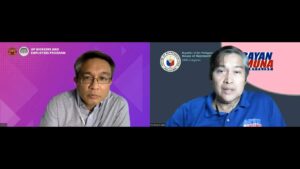
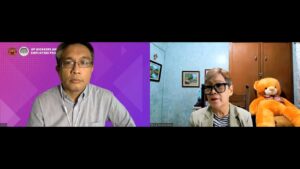
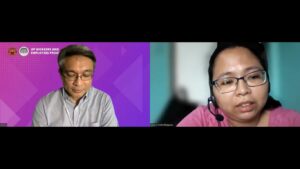
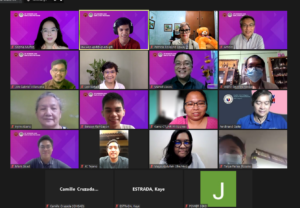
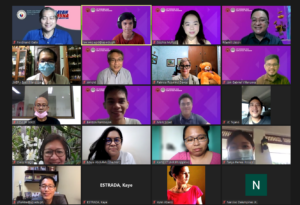






































































































 on the upper right corner to select a video.
on the upper right corner to select a video.